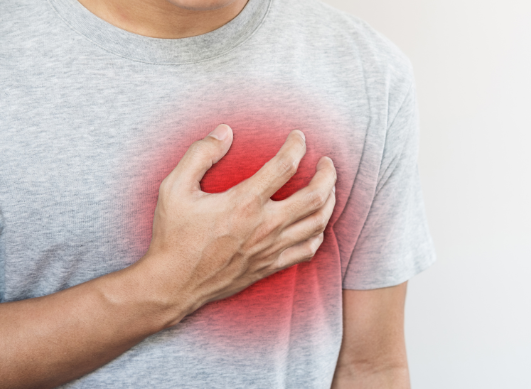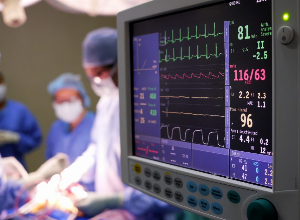Dilated cardiomyopathy (DCM): What should you know about this common yet underdiagnosed heart disease?
Published Dec 30, 2024 • By Somya Pokharna
Dilated Cardiomyopathy (DCM) is a condition where the heart's main pumping chamber, the left ventricle, becomes enlarged and weakened. This impairs the heart's ability to pump blood efficiently, potentially leading to heart failure and other complications.
What causes DCM? What are its symptoms? How can it be diagnosed and treated?
Find out all about it in this article.

What is dilated cardiomyopathy (DCM)?
Dilated Cardiomyopathy (DCM) is a type of cardiomyopathy, which refers to diseases of the heart muscle. In DCM, the heart's left ventricle becomes enlarged (dilated) and cannot contract effectively, which reduces the amount of blood the heart can pump to the rest of the body. Over time, this can affect other chambers of the heart as well, leading to heart failure.
What causes dilated cardiomyopathy?
The exact cause of DCM is often unknown, but it is believed to result from a combination of genetic and environmental factors. Here are some common causes:
Genetic factors
Up to 50% of DCM cases are believed to have a genetic component. Mutations in certain genes that influence heart muscle function can be inherited from one or both parents.
Infections
Viral infections that affect the heart muscle, such as myocarditis, can lead to DCM. These infections cause inflammation and damage to the heart muscle, impairing its function.
Toxins and medications
Long-term exposure to toxins such as alcohol, cocaine, or certain chemotherapy drugs can damage the heart muscle and lead to DCM.
Autoimmune diseases
Conditions where the immune system attacks the body’s own tissues, such as lupus, can affect the heart muscle and contribute to the development of DCM.
Nutritional deficiencies
Deficiencies in certain nutrients, particularly thiamine (vitamin B1), can lead to a form of DCM known as beriberi heart disease.
What are the symptoms of dilated cardiomyopathy?
The symptoms of DCM can vary depending on the severity of the condition and which parts of the heart are involved. Common symptoms include:
- Shortness of Breath: Especially during physical activity or when lying down.
- Fatigue: A constant feeling of tiredness and lack of energy.
- Swelling: In the legs, ankles, feet, and abdomen due to fluid build-up.
- Chest Pain: Occasional chest pain or discomfort.
- Palpitations: Irregular heartbeats or a feeling of the heart racing.
- Dizziness or Lightheadedness: Due to reduced blood flow to the brain.
How is dilated cardiomyopathy diagnosed?
Diagnosing DCM involves a combination of medical history, physical examination, and various diagnostic tests. Here are some commonly used methods:
- Physical examination: The doctor will check for signs of heart failure, such as swelling in the legs and abdomen, and listen for abnormal heart sounds.
- Electrocardiogram (ECG): This test records the electrical activity of the heart and can detect irregular heart rhythms and other abnormalities.
- Echocardiogram: An ultrasound of the heart that provides detailed images of the heart’s structure and function. It can show the size of the heart chambers and how well the heart is pumping.
- Chest X-Ray: Can show the size and shape of the heart and check for fluid build-up in the lungs.
- Cardiac MRI: Provides detailed images of the heart’s structure and can detect scarring or other changes in the heart muscle.
- Blood tests: To check for signs of heart failure and other conditions that might cause or worsen DCM.
- Genetic testing: If a genetic cause is suspected, genetic testing can identify mutations associated with DCM.
What kind of treatments are available for dilated cardiomyopathy?
While there is no cure for DCM, various treatments can help manage the symptoms, improve heart function, and prevent complications, such as:
Medications
- Beta-Blockers reduce the heart’s workload and help control irregular heart rhythms.
- ACE Inhibitors help relax blood vessels and reduce blood pressure, making it easier for the heart to pump blood.
- Diuretics help reduce fluid build-up in the body.
- Anticoagulants prevent blood clots, which can be a complication of DCM.
Lifestyle changes
- Eating a heart-healthy diet that is low in salt and saturated fat.
- Regular physical activity, as recommended by a healthcare provider.
- Avoiding alcohol and drugs to prevent further damage to the heart.
Devices and surgical procedures
- Pacemakers and Implantable Cardioverter-Defibrillators (ICDs) help control abnormal heart rhythms and prevent sudden cardiac death.
- Left Ventricular Assist Devices (LVADs) are mechanical pumps that help the heart pump blood.
- In severe cases where other treatments are not effective, a heart transplant may be considered.
Genetic counseling
For patients with a genetic form of DCM, genetic counseling can provide information about the risk to family members and guide decisions about genetic testing.
Key Takeaways
Dilated cardiomyopathy is a chronic and potentially serious condition, but with proper management and treatment, many people with DCM can lead active and fulfilling lives. Understanding the causes, recognizing the symptoms, and seeking timely medical care are crucial steps in managing this condition. Advances in research and treatment continue to improve the outlook for individuals with DCM, offering hope for better outcomes in the future.
Was this article helpful to you?
Give it a “Like” and share your thoughts and questions with the community in the comments below!
Take care!
Sources:
Arbustini E, & Di Toro A, & Giuliani L, & Urtis M, & Dec G, & Narula J (2022). Dilated cardiomyopathy. Fuster V, & Narula J, & Vaishnava P, & Leon M.B., & Callans D.J., & Rumsfeld J.S., & Poppas A(Eds.), Fuster and Hurst's The Heart, 15e. McGraw-Hill Education.
Dilated Cardiomyopathy (DCM). (2017). American Heart Association.
Dilated cardiomyopathy (DCM). (2022). British Heart Foundation.
Kasper, E. K., Agema, W. R., Hutchins, G. M., Deckers, J. W., Hare, J. M., & Baughman, K. L. (1994). The causes of dilated cardiomyopathy: a clinicopathologic review of 673 consecutive patients. Journal of the American College of Cardiology, 23(3), 586–590.
Mahmaljy, H., Yelamanchili, V. S., & Singhal, M. (2023). Dilated cardiomyopathy. StatPearls Publishing.
Orphanou, N., Papatheodorou, E., & Anastasakis, A. (2022). Dilated cardiomyopathy in the era of precision medicine: latest concepts and developments. Heart failure reviews, 27(4), 1173–1191.

 Facebook
Facebook Twitter
Twitter


